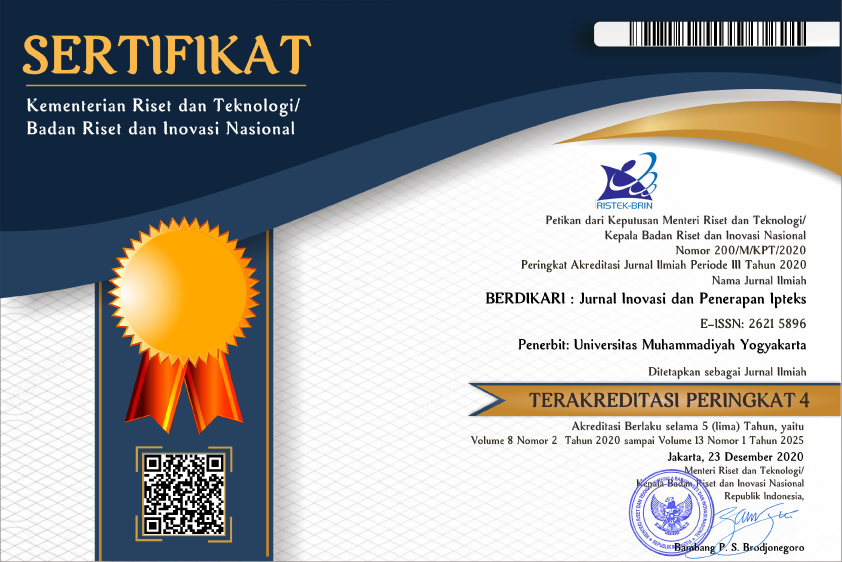Pembentukan dan Peningkatan Kapasitas Kelompok Perukti Jenazah Perempuan
DOI:
https://doi.org/10.18196/berdikari.v9i2.10209Keywords:
mortician, women, trainingAbstract
Islam teaches that every human being will experience death. The obligation of a Muslim to a Muslim who dies is fard kifayah, meaning that if some Muslims have carried it out, then the obligations have finished. These obligations are bathing, shrouding, praying and burying the dead. Women’s bodies must be treated specifically by the female coroner’s team. Hamlet Kembaran already has several ladies who are active in the care of corpses, despite the limited number. Accordingly, it affects the treatment of female corpses, where they are often assisted and guided by male coroners. Thus, more female mortuary teams are necessary with the knowledge, skills and independence in caring for women’s corpses and psychological assistance for bereaved families through the formation of a women’s mortuary team in the Kembaran hamlet. The program aimed to increase the knowledge and skills of the women’s congregation in the care (rukti) of women’s bodies through tutorials and practices. The implementation of the methods was carried out online using video tutorials and practices. The participants were 30 women, members of the Babul Jannah recitation, who were willing to take part in the training. The training was carried out for one month by a service team with religious and psychological expertise. Also, the videos and modules were created by the team. The training was carried out online through the Whatsapp group by providing material in the form of modules, presentation slides and videos of corpse care practices. The results of this community service program indicated that the knowledge, skills and behavior of the women’s congregation improved significantly, and they are ready to practice the care (rukti) of women’s bodies independently.
References
Atha, Muhammad Abdul Qadir. Tt. Al-Tadzkirah fi Ahwal al-Mauta wa Umur al-Akhirah. Kairo: Dar al-taqwa li al-Turats.
‘Uwaidah, Kami Muhammad. (1999). Fiqih Wanita. Jakarta: Pustaka Al-Kautsar.
Al-Bugha, Musthafa Dib, (2012). Ringkasan Fiqih Mazhab Syafi’i. jakart: Noura Books
Al-Bukhari. (2003). Shahih al-Bukhari. Beirut: Dar al-Kutub al-Ilmiyyah
Al-Fauzan, Shalih Fauzan. (1423H). al-Mulakhash al-Fiqh. Riyadl: Dal Al-Ashimah.
Al-Jazairi, Abu bakr Jabir. (2006). Minhaj al-Muslim: Kitab aqaid wa Ada bwa Akhlaq wa Ibadat wa Mu’amalat. Beirut: Dar al-bayan Li ‘Ulum al-Quran.
Al-Quran al-Karim
Al-Zuhaili, Wahbah. (1997). Al-Fiqh al-Islami wa Adillatuhu. Damaskus: Dar al-Fikr
Fahmi, Muhammad Alfa Rayyan. (2019). Hubungan Pengetahuan Mahasiswa Tentang Perawatan Jenazah Secara Islam Dengan Adab Mahasiswa Terhadap Kadaver Di FKIK UMY. http://repository.umy.ac.id/handle/123456789/27563
Majelis Tarjih dan Tajdid Pimpinan Pusat Muhammadiyah. (2009). Tanya Jawab Agama 5. Cetakan IV. Yogyakarta: Suara Muhammadiyah.
Majelis Tarjih dan Tajdid Pimpinan Pusat Muhammadiyah. (2013). Himpunan Putusan Tarjih Muhammadiyah. Yogyakarta: Suara Muhammadiyah.
Majelis Tarjih dan Tajdid Pimpinan Pusat Muhammadiyah. (2018). Himpunan Putusan tarjih Muhammadiyah 3. Cetakan I. Yogyakarta: Suara Muhammadiyah.
Marzuki. (2018). Perawatan Jenazah. http://staff.uny.ac.id/sites/default/files/pengabdian/dr-marzuki-mag/dr-marzuki-mag-perawatan-jenazah.pdf Diakses pada 20 Juli 2020
Murad, Musthafa. (2005). Khuluq al-Mukmin. Kairo: Dar al-Fajr li-Turats.
Muslim. (2001). Shahih Muslim. Beirut: Dar al-Kutub al-Ilmiyyah
Notoatmodjo, S. 2014. Ilmu Perilaku Kesehatan. Jakarta: Rineka Cipta
Pengapdian Masyarakat UMY. Tutorial Mengkafani Jenazah Part 1. Diakses pada September 2020 https://www.youtube.com/watch?v=BoXg9_IQ1NU&feature=youtu.be
Pengapdian Masyarakat UMY. Cara Perawatan Jenazah Part 3. Diakses pada September 2020 https://www.youtube.com/watch?v=NBBJgqlBZzo&feature=youtu.be
Pengapdian Masyarakat UMY. Cara Perawatan Jenazah Part 4. Diakses pada September 2020 https://www.youtube.com/watch?vNnBAJrDwPdE&feature=youtu.be
Pengapdian Masyarakat UMY. Tutorial Mengkafani Jenazah. Diakses pada September 2020 https://youtu.be/8gqPd75lm-k
Pengapdian Masyarakat UMY. Muqodimah Manusia Pasti Mati Part 2. Diakses pada September 2020 https://youtu.be/iN4rUH9Igmo
Pengapdian Masyarakat UMY. Pengantar Praktek. Diakses pada September 2020 https://youtu.be/j0OoZqaukcE
Pengapdian Masyarakat UMY. Muqodimah Manusia Pasti Mati. Diakses pada September 2020 https://youtu.be/PO-S5eQdj2Q
Pengapdian Masyarakat UMY. Pengantar Tuntunan Merawat Jenazah. Diakses pada September 2020 https://youtu.be/QqfU8YGhxNA
Nurdianto, Talqis. (2020). Oase Biru Di Hong Kong: Catatan Safari Dai Cordofa. Sleman: Zahir Publishing.
Rahmatullah, Azam Syukur. (2016). Pendidikan Kematian (Death Education) Sebagai Upaya Penanganan Kenakalan Peserta Didik Remaja (Juvnile Delinquency) Di Sekolah/Madrasah. http://repository.umy.ac.id/handle/123456789/25703
Sabiq, Sayyid. (2005). Fiqh al-Sunnah. Kairo: Maktabah Dar al-Turats.
Setiawan, Asep. (2020). Pelatihan Perawatan Jenazah Sesuai Sunnah (Teori Dan Praktek) Bagi Masyarakat Jobolawang, Pagerharjo, Samigaluh, Kulon Progo. http://repository.umy.ac.id/handle/123456789/32672
Setiawan, Asep. Et.Al. (2016). Panduan Kuliah Intensif Al-Islam (KIAI) UMY. http://repository.umy.ac.id/handle/123456789/12677
Tinartayu, Seshy. Miftahulhaq. (2020). Buku Saku Rukti Jenazah Menurut Syari'at Islam dan Kesehatan. http://repository.umy.ac.id/handle/123456789/34333
Downloads
Published
Issue
Section
License
Copyright
Authors retain copyright and grant BERDIKARI Jurnal Inovasi dan Penerapan IPTEK the right of first publication with the work simultaneously licensed under an Attribution 4.0 International (CC BY 4.0) that allows others to remix, adapt and build upon the work with an acknowledgment of the work's authorship and of the initial publication in BERDIKARI Jurnal Inovasi dan Penerapan IPTEK.
Authors are permitted to copy and redistribute the journal's published version of the work (e.g., post it to an institutional repository or publish it in a book), with an acknowledgment of its initial publication in BERDIKARI Jurnal Inovasi dan Penerapan IPTEK
License
Articles published in the BERDIKARI Jurnal Inovasi dan Penerapan IPTEK) are licensed under an Attribution 4.0 International (CC BY 4.0) license. You are free to:
- Share — copy and redistribute the material in any medium or format.
- Adapt — remix, transform, and build upon the material for any purpose, even commercially.
This license is acceptable for Free Cultural Works. The licensor cannot revoke these freedoms as long as you follow the license terms. Under the following terms:
- Attribution — You must give appropriate credit, provide a link to the license, and indicate if changes were made. You may do so in any reasonable manner, but not in any way that suggests the licensor endorses you or your use.
- No additional restrictions — You may not apply legal terms or technological measures that legally restrict others from doing anything the license permits.




